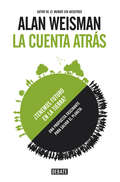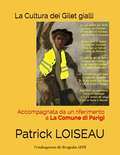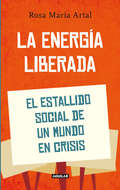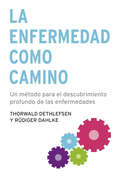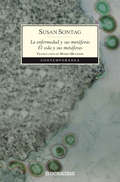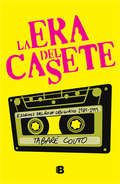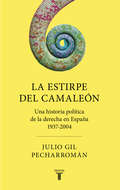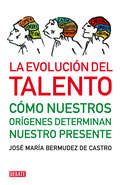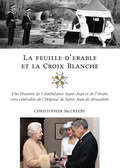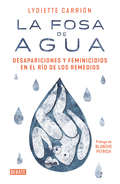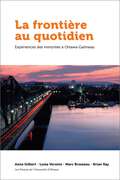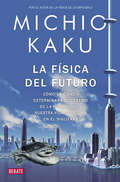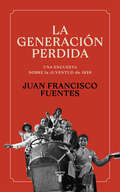- Table View
- List View
La cuarta revolución industrial
by Klaus Schwab¿Qué es la cuarta revolución industrial? ¿Cómo definirá nuestro futuro? Un libro sobre el cambio de paradigma que vive nuestra sociedad actual por el fundador del Foro Davos. Son muchos los desafíos a los que se enfrenta el mundo hoy en día, pero posiblemente uno de los más importantes sea comprender la nueva revolución tecnológica que está acarreando la transformación de la humanidad debido a la convergencia de sistemas digitales, físicos y biológicos. Las nuevas tecnologías están cambiando la manera en la que vivimos, trabajamos y nos relacionamos los unos con los otros y la velocidad, amplitud y profundidad de esta revolución nos están obligando a repensar cómo los países se desarrollan, cómo las organizaciones generan valor e incluso lo que significa ser humanos. En La Cuarta Revolución Industrial, Klaus Schwab, fundador del Foro Económico Mundial, describe las características clave de la nueva revolución tecnológica y resalta las oportunidades y dilemas que ésta plantea. Las nuevas formas de colaboración y gobernabilidad, acompañadas de una narrativa positiva y compartida, pueden moldear la cuarta revolución industrial para beneficio de todos. Si aceptamos la responsabilidad colectiva de crear un futuro en el que la innovación y la tecnología sirvan a las personas, podremos llevar a la humanidad a nuevos niveles de conciencia moral.
La cuenta atrás: ¿Tenemos futuro en la tierra?
by Alan WeismanUna propuesta fascinante para salvar el planeta. La cuenta atrás es un libro audaz, inteligente y provocador, que nos explica cuáles son los efectos de nuestro desmesurado crecimiento demográfico y plantea la alternativa más rápida y razonable para restaurar el equilibrio. Una investigación de conclusiones revolucionarias que cambiará la manera en que vemos nuestras vidas y nuestro destino. El crecimiento de la población mundial se ha disparado hasta límites insostenibles: dado que cada cuatro días y medio nace un millón de personas más en un planeta finito, la población actual precisaría de los recursos de tres Tierras para alcanzar un nivel de vida semejante al de los países desarrollados, y con el sobrecalentamiento de la atmósfera y las alteraciones de los océanos, las perspectivas de un futuro sostenible para la humanidad son cada vez más dudosas. Weisman ha recorrido todo el planeta para hablar con personasque viven bajo sistemas políticos distintos, y para saber cómo viven y qué piensan gentes de distintas nacionalidades, culturas y religiones. Quiere conocer para poder dar respuesta a las preguntas que, según todos los expertos, son las más importantes y también las más difíciles de responder.
La cultura
by Dietrich SchwanitzÉste es un libro para aquellos que quieren tener una relación viva con su cultura. Muchas veces el conocimiento se ha visto encorsetado por fórmulas y barreras, y se ha alejado de su labor más útil, que es enriquecer nuestras vidas y ayudar a conocernos mejor. ¿Cómo y por qué surgieron la sociedad moderna, el Estado, la ciencia, la democracia o la administración? ¿Qué ha dicho Heidegger que no supiéramos ya? ¿Por qué Don Quijote, Hamlet, Fausto, Robinson, Falstaff o el Dr. Jekyll y Mr. Hyde son figuras tan conocidas? ¿Dónde estaba el inconsciente antes de Freud? Este libro aborda los episodios remotos y centrales del Antiguo y Nuevo Testamento; la emergencia de los Estados y la epopeya de la modernización, las revoluciones y la democracia; la evolución de la literatura, el arte y la música a través de sus grandes obras; el desarrollo de la ciencia y la filosofía, el campo de batalla de las ideologías, cosmogonías y teorías; pero también la educación que dan los libros, los colegios o universidades, los periódicos y los foros de opinión. Un cuadro cronológico, una breve relación de los libros que han cambiado el mundo y consejos de lectura aumentan la utilidad de esta obra imprescindible.
La cultura de los árabes
by Ikram AntakiCONOCE LA CULTURA DE LOS ÁRABES DE LA PLUMA DE IKRAM ANTAKI «El poeta Abul-Atahiya había grabado en el interior de su anillo: “Maldiga dios a la gente”. Y la gente que conoció eran aquellos árabes conquistadores y comerciantes que tradujeron la filosofía y la ciencia de los griegos, pero jamás dieron a conocer su propia literatura, que observaron el mundo y se olvidaron del cuerpo, que ejercieron hasta el cansancio su mente y desconocieron su alma. Quise hablar de estos árabes cuerdos y necios, derechos y torcidos, que he conocido a través de la vida compartida, de las leyes, de la literatura, del arte, de la filosofía, de la economía...
La cultura dei gilet gialli
by Patrick LoiseauIl movimento dei gilet gialli risuona il 17 novembre 2018 come un’insurrezione pregna di tutte le promesse democratiche: per finire con Macron, con le sue “riforme”, forse anche con le istituzioni bonapartiste della Quinta Repubblica. Sette mesi più tardi, incapace di strutturarsi, perso sulle pendici illusorie delle elezioni europee e poi del discorso “municipalista”, il crollo era totale. I gilet gialli sono sempre presenti ma hanno dovuto ritirarsi per un po’, con la promessa di ritornare…
La cultura: Todo lo que hay que saber (Ensayo (punto De Lectura) Ser.)
by Dietrich SchwanitzLa gran biblia cultural. Ésta es una obra para aquellos que quieren tener una relación viva con el saber, sin fórmulas ni barreras. Para los que piensan que la labor más útil de la cultura es enriquecer nuestras vidas y ayudar a conocernos mejor. <P><P>Éste es un libro para aquéllos que quieren tener una relación viva con su cultura. Muchas veces el conocimiento se ha visto encorsetado por fórmulas y barreras, y se ha alejado de su labor más útil, que es enriquecer nuestras vidas y ayudar a conocernos mejor. <P>¿Cómo y por qué surgieron la sociedad moderna, el Estado, la ciencia, la democracia o la administración? ¿Qué ha dicho Heidegger que no supiéramos ya? ¿Por qué Don Quijote, Hamlet, Fausto, Robinson, Falstaff o el Dr. Jekyll y Mr. Hyde son figuras tan conocidas? ¿Dónde estaba el inconsciente antes de Freud? <P>Este libro aborda los episodios remotos y centrales del Antiguo y Nuevo Testamento; la emergencia de los Estados y la epopeya de la modernización, las revoluciones y la democracia; la evolución de la literatura, el arte y la música a través de sus grandes obras; el desarrollo de la ciencia y la filosofía, el campo de batalla de las ideologías, cosmogonías y teorías; pero también la educación que dan los libros, los colegios o universidades, los periódicos y los foros de opinión. Este libro, además, contiene una tabla cronológica, una breve relación de los libros que han cambiado el mundo, consejos de lectura y un índice onomástico muy detallado que aumentan la utilidad de esta obra imprescindible.
La distinción
by Pierre BourdieuUna reformulación de todas las tradicionales interrogaciones sobre lo bello, el arte, el gusto y la cultura. Los sujetos sociales se diferencian por las distinciones que realizan -entre lo sabroso y lo insípido, lo bello y lo feo, lo distinguido y lo vulgar- en las que se expresa o se traiciona su posición. El análisis de las relaciones entre los sistemas de enclasamiento (el gusto) y las condiciones de existencia (la clase social) conduce así a una crítica social del criterio selectivo que es, inseparablemente, una descripción de las clases sociales y de los estilos de vida. Podría comenzarse la lectura de este libro por el capítulo final, titulado «Elementos para una crítica "vulgar" de las críticas puras», que pone de manifiesto las categorías sociales de percepción y apreciación que utiliza Kant en su análisis del juicio del gusto. Pero lo esencial de esta ya clásica obra del sociólogo francés Pierre Bourdieu se encuentra en la investigación que, al precio de un enorme trabajo de encuesta empírica y de crítica teórica, conduce a una reformulación de todas las tradicionales interrogaciones sobre lo bello, el arte, el gusto y la cultura.
La energía liberada: El estallido social de un mundo en crisis
by Rosa M ArtalUn análisis profundo de la crisis, por qué no se remedia y qué soluciones está arbitrando la sociedad civil. Vivimos en una cultura social que sólo mira la superficie. Sabemos, no obstante, que debajo de la corteza terrestre se genera un tipo de energía que en ocasiones se libera y genera vida. Asimismo la sociedad se ve alterada por fuerzas económicas, mediáticas, políticas muy activas -el neoliberalismo, los gobiernos sometidos a los poderes económicos, Barack Obama, los países emergentes, la Unión Europea, España-, de compleja estructura y variados matices, que influyen en ella de una u otra manera, se empujan o alían. Éste es el tiempo de los grandes movimientos. Necesitamos sentir que somos capaces de poder cambiar nuestro presente para que no nos arrebaten nuestros derechos, para que quienes gestionan nuestra existencia no nos engañen con su mutismo mientras se acumulan los agravios, para dejar de respirar tanta zozobra. La periodista Rosa María Artal, coordinadora y coautora de Reacciona, parte de una metáfora geológica para articular de manera magistral un análisis profundo de la crisis, por qué no se remedia, qué soluciones está arbitrando la sociedad civil y el impacto de movimientos como Wikileaks, el volcán islandés, el 15M o el renacimiento de una conciencia ciudadana. Un libro necesario que recoge la vehemencia y el empuje de los ciudadanos que luchan por conseguir cambiar sus destinos, que ya son energía liberada y ansían sumar fuerzas a esa erupción, una explosión de dignidad que actúe más allá de la superficie.
La enfermedad como camino: Un método para el descubrimiento profundo de las enfermedades
by Thorwald DethlefsenLa enfermedad como camino analiza el significado de los quebrantos de salud más habituales. No hay una diversidad de enfermedades curables, sino una sola enfermedad determinante del «mal estar» del individuo. Lo que llamamos enfermedades son en realidad síntomas de esta única enfermedad.Este libro analiza el significado de las infecciones, los dolores de cabeza, los trastornos cardíacos y los quebrantos de salud más habituales. Todos los síntomas tienen un sentido profundo para la vida de la persona: nos transmiten mensajes del ámbito espiritual, y de su adecuada interpretación dependerá nuestra capacidad de recuperarnos. Se incluye un capítulo especial dedicado al problema del sida, así como un índice de enfermedades y una relación de las partes y los órganos del cuerpo con sus atributos psíquicos.
La enfermedad y sus metáforas | El sida y sus metáforas
by Susan SontagEste volumen reúne los ensayos, La enfermedad y sus metáforas y El sida y sus metáforas, que siguen ejerciendo una influencia enorme en la reflexión médica y en las vidas de miles de pacientes y cuidadores. Susan Sontag escribió La enfermedad y sus metáforas en 1978, mientras se trataba de un cáncer. En el libro quiso demostrar cómo los mitos acerca de algunas enfermedades, en especial del cáncer, añaden más dolor al sufrimiento de los pacientes y a menudo los cohíben en la búsqueda de tratamiento adecuado. Casi una década después, con la irrupción de una nueva enfermedad estigmatizada y transida de incertidumbres y «fantasías punitivas», Sontag escribió El sida y sus metáforas, extendiendo los argumentos del libro anterior a la pandemia de sida. Reseña:«Un ensayo luminoso.»Cristina Peri Rossi
La era del casete: Escritos del rock uruguayo 1985-1995
by Tabaré CoutoUn libro que recorre las expresiones culturales y los principales referentes de los años 80. El rock, las publicaciones, la calle y el Uruguay post dictadura en un libro donde la voz es de los protagonistas de ese movimiento. Tabaré Couto un referente de la comunicación de esa época escribe y recopila notas que pintan una década, un movimiento que hoy es mirado con nostalgia. Los lectores encontrarán en este libro una plétora de información que proviene de una gran cantidad de publicaciones (artículos, entrevistas, reseñas de discos y conciertos) sobre rock uruguayo, aparecidas durante la década que va de 1985 a 1995. Tabaré Couto, activo participante de la movida que rodeó al rock de aquella época, relee, con prosa elocuente y con la ayuda de sus recuerdos, esas fuentes. Su memoria aporta no solo datos de importancia, sino también interpretaciones personales que arrojan nueva luz sobre aquel fenómeno. Pero tal vez lo más significativo de este trabajo sea su capacidad de ver, con la perspectiva que da el tiempo, con agudeza, nostalgia y autocrítica, no solo los hechos sino también las líneas de fuerza que caracterizaron ese momento histórico. Su visión de ese proceso, que incluye esclarecedoras alusiones al panorama político y social del Uruguay de aquellos tiempos, es no solo compleja e inteligente, sino que además está aderezada por la ecuanimidad de aquel que no ha vivido en vano. Eso no quiere decir que su mirada, a fuer de serena, sea distante. Por el contrario, este es un libro escrito desde el sentimiento y la emoción, por alguien que supo vivir el rock de aquellos tiempos pasionalmente. Gracias a este libro, la historia del rock uruguayo se ha vuelto más rica e inteligible. Gustavo Verdesio
La era del fútbol
by Juan José SebreliUna visión negativa del deporte más popular de la Argentina. El fútbolvisto críticamente por un agudo observador de la realidad argentina ymundial. Juan José Sebreli tiene una visión negativa del deporte más popular enla Argentina. Por eso, con implacable determinación, no contempla elentusiasmo de fanáticos y simpatizantes, ni se detiene a enumerar losatractivos del fútbol, sino que denuncia los negocios que se mueven a sualrededor, y se niega a pasar por alto la hipocresía y la devaluaciónmoral que acarrean. Lúcida detracción del deporte de multitudes, avaladapor argumentos sostenidos con entereza moral e intelectual.
La esclavitud femenina
by John Stuart MillUn ensayo feminista pionero firmado por uno de los grandes filósofos del siglo XIX. Publicado en 1869, La esclavitud femenina abordó con valentía el problema de la desigualdad entre los sexos, definiéndolo como «uno de los principales obstáculos para el progreso de la humanidad». En opinión de John Stuart Mill, que publicó este tratado cuando las mujeres de su país no podían votar ni disponer de bienes, alcanzar una «igualdad perfecta» en materia legal y social era indispensable para una sociedad más justa, y no cabe duda de que su libro contribuyó a crearla al desmontar con implacable lógica el endeble argumentario de quienes favorecían la opresión histórica de la mujer. Nuestra edición incluye el prólogo de Emilia Pardo Bazán a la primera traducción española, así como una introducción actual de Amelia Valcárcel, que pone en perspectiva la historia del texto y sus ideas.
La estirpe del camaleón: Una historia política de la derecha en España (1937-2004)
by Julio Gil PecharrománPara entender nuestro presente, un libro sobre la evolución de las distintas corrientes políticas de la derecha española desde la formación del Movimiento hasta el final del aznarismo. Este libro estudia la evolución de unas «derechas» de naturaleza muy variada y cambiante, con proyectos políticos y sociales frecuentemente contrapuestos, pero que han compartido dos características generales: el nacionalismo identitario y un concepto moral del orden social entendido genéricamente como «confesionalidad católica» o bien, desde un planteamiento distinto, como «humanismo cristiano». La derecha española ha desarrollado, desde 1937 hasta 2004, procedimientos de «destrucción creativa» en la evolución de su sistema de partidos, disolviendo sin grandes problemas aquellas de sus organizaciones que resultaban ya disfuncionales -el Movimiento Nacional, la Unión de Centro Democrático, Alianza Popular, etcétera- y sustituyéndolas con otras que rescataban a su personal político y a sus votantes, pero bajo una pragmática modificación de programas y modelos organizativos para ajustarlos a las nuevas condiciones del mercado electoral. Un sistema que requiere capacidad camaleónica para, en el más breve plazo, transformar estructuras, crear nuevos líderes, adaptar doctrinas a la modernidad y lavar pasados personales, o jubilar a los poseedores de pasados ahora impresentables. La crítica ha dicho...«Incluye al mismo tiempo que amplía: [...] una ambiciosa obra de síntesis, escrita en un lenguaje divulgativo, con cierta intención analítica [...] y el propósito de organizar de algún modo y dar sentido a una realidad tan variada.»Óscar R. Buznego, La Nueva España - Cultura
La evolución del talento: Como nuestros origenes determinan nuestro presente
by José María Bermúdez de CastroAprende qué nos enseña la evolución del hombre y del cerebro sobre la gestión del talento y de las relaciones humanas. Los orígenes del ser humano, de dónde venimos y cómo hemos llegado hasta aquí, es una de las cuestiones más fascinantes a las que se enfrenta la ciencia. <p><p>José María Bermúdez de Castro reflexiona sobre la gestión de equipos de trabajo, de qué modo se relacionan entre sí los seres humanos y cómo nuestro viaje evolutivo ha determinado esos patrones de conducta. Este apasionante ensayo reúne estos dos temas y, mientras sigue el camino que lleva de los primeros homínidos hasta el Homo sapiens, explica cómo las adaptaciones obligadas por el entorno han determinado muchas de las características de la sociedad actual.
La evolución del término y definición de zombi y sus posibles orígenes literarios
by Sergio Casado Rodríguez Karla M. V.El objetivo de este estudio es mostrar los posibles orígenes e influencia para la formulación del concepto de zombi anglo-americano, a través del análisis de distintas criaturas como el golem, el autómata, el lich, el ghoul o el zombi haitiano, entre otras, que aparecen tanto en la historia como en distintas religiones y partes del mundo. El estudio también muestra como la serie American Horror Story consigue crear una hibridación entre el zombi moderno y el zombi vudú haitiano que nos sorprende dando lugar a una nueva versión del monstruo de Frankenstein.
La federal: La trampa policial detrás del delito, la inseguridad y el miedo
by Alejandro GuerreroLa Policía Federal Argentina en los últimos 10 años y sus vínculos conel delito. "La secta del gatillo fácil es también la logia de la mano en la lata."Rodolfo Walsh¿Qué distingue a la Policía Federal Argentina (en verdad, a todas laspolicías del país) de muchas otras de distintos países? Simplemente, quela PFA empieza a perder su calidad de custodia de la gobernabilidad, lafunción básica de cualquier fuerza policial.Esta es una policía cada vez más débil (no menos peligrosa, más bien locontrario) y no por presupuesto escaso, o falta de equipos o depersonal. Tampoco por la ausencia de leyes de "mano dura" o defacilidades para burlar esas mismas leyes, como lo dejan ver loscentenares de casos de gatillo fácil.Esta policía parece haberse debilitado a sí misma. Se ha corroídointernamente enredada en el entretejido de sus nexos con el delito, conun mundo penumbroso del cual, en buena medida, ha llegado a formarparte.Esta policía parece haberse salido de cauce, haber escapado, en cuantocorporación, al control político de los gobernantes. He ahí,básicamente, la sustancia de la "sensación de inseguridad".Este libro, además de situar el problema en su contexto histórico ysocial, recorre diez años de casos emblemáticos #y de otros no tanconocidos# que develan una trama institucional de vinculaciones entre laPolicía Federal y el crimen organizado.
La feuille d'erable et la Croix-Blanche
by Christopher MccreeryEn tant que fondation de l’Ordre de Saint-Jean, Ambulance Saint-Jean assure la prestation de cours de secourisme au Canada depuis maintenant 125 ans. De l’aide apportée sur les chantiers ferroviaires de la Belle Époque et dans les hôpitaux militaires de la Première Guerre mondiale aux programmes et services offerts par l’organisme bénévole que nous connaissons aujourd’hui, le présent ouvrage décrit les inestimables contributions de l’Ordre à notre pays et retrace la remarquable histoire de tous ceux qui ont permis à l’Ordre d’exister. Perpétuant une ancienne tradition hospitalière qui remonte aux dixième et onzième siècles, l’Ordre de Saint-Jean moderne prit racine dans la reprise des activités de bienfaisance en Angleterre en 1831. En 1883, la constitution de l’Ordre de Saint-Jean au Canada marqua le début d’une longue et distinguée histoire de services rendus aux Canadiens et aux populations du monde entier. Organisme bénévole national regroupant plus de 25 000 Canadiens, Ambulance Saint-Jean demeure à ce jour le chef de file canadien en matière de formation en secourisme.
La filosofía de ser niños
by Christopher PhillipsCómo liberar la creatividad, la curiosidad y la razón a través de la sabiduría de los más jóvenes. La niñez es nuestra plataforma de despegue, el periodo de la vida en el que el aprendizaje es más intenso, y adquirimos el conocimiento crítico y las habilidades que nos permitirán adaptarnos. Filósofos de todas las épocas han señalado que, con el paso del tiempo, los seres humanos tendemos a encogernos mental y emocionalmente. Desvirtuamos nuestra naturaleza -caracterizada por la curiosidad, la empatía, la razón, el asombro y el deseo de experimentar y entender- y, de esta manera, se va volviendo borroso nuestro sentido de identidad. Comenzamos nuestras vidas con un estallido moral, intelectual y creativo. Siguiendo las evidencias científicas que así lo demuestran, Christopher Phillips advierte que la niñez no es simplemente un estado de desarrollo, de transformación -de llegar a ser-, ni la adultez un momento de plenitud o acabamiento. Si aprovechamos las cualidades propias de la niñez, no estaremos condenados a volvernos seres desanimados y frágiles, sino que creceremos y viviremos guiados por el asombro, la curiosidad, la imaginación, el sentido de juego y la compasión. Explorando y explotando la filosofía de ser niños, podremos desarrollar ilimitadamente nuestro potencial. Vinculando filosofía, ciencias sociales, investigación neurocientífica y anécdotas personales, este libro propone una aproximación radicalmente distinta al tema de la frontera entre niñez y adultez, para mostrarnos que la forma como los niños ven y viven el mundo puede ser una clave para un desarrollo pleno, para alcanzar eso que los griegos llamaban areté o excelencia.
La fosa de agua: Desapariciones y feminicidios en el río de los Remedios
by Lydiette Carrión«Éste es apenas un rincón de la anomalía de México, un país roto, con más de 30 mil desaparecidos en su geografía» Blanche Petrich Este libro documenta las desapariciones de al menos diez adolescentes - todas estudiantes, con el futuro por delante- en la zona de Ecatepec y Los Reyes Tecámac, en el Estado de México. Lydiette Carrión narra con vértigo la odisea de los padres para encontrar a sus hijas; la precariedad de las investigaciones, realizadas por un sistema policiaco laberíntico, corrupto, criminal y altamente ineficaz, y la estigmatización que sufren las víctimas aún en la muerte. Al final, las autoridades vincularon varias de las desapareciones a Erick Sanjuán Palafox, alias el Mili, y sus cómplices, capturados en 2014 y acusados de feminicidio y narcomenudeo tras un proceso lleno de irregularidades. Aunque este caso confirmó, por la juventud de losvictimarios y la brutalidad con que violentaron a la única joven de la que se ha podido esclarecer con certeza su destino, que estamos ante una crisis humanitaria de grandes proporciones, muchas dudas aún prevalecen: ¿cuántas de las desapariciones, de los feminicidios, pueden atribuirse a la banda del Mili? ¿Será que este caso sacó a la luz la evidencia de un tipo de crimen organizado más sádico y voraz? ¿Quién está detrás de las desapariciones que todavía ocurren en la zona?
La frontera que vino del norte
by Carlos González HerreraA partir de un estudio de caso -El Paso, Texas Ciudad Juárez, Chihuahua- Carlos González Herrera hace el recuento de las prácticas socio-culturales de los procesos de construcción y consolidación de los estados nacionales y de sus fronteras comunes, entre 1880 y 1930. La frontera de México con Estados Unidos, tal como hoy la conocemos, es el resultado de una compleja maquinaria cultural y de ingeniería social para que conceptos como soberanía, ciudadanía, Estado-nación, raza, nacional o extranjero se acreditaran como guía de la vida diaria de los habitantes de esta región. El simple trazado de una línea divisoria en 1848, no bastó para que los grupos sociales que la habitaban, aceptaran de manera inmediata una nueva forma de organización. Para Estados Unidos la frontera se convirtió en un proceso de autoafirmación imperial con rasgos políticos, culturales, raciales, médico-científicos, económicos y militares. Mientras que para México, la frontera, continuó siendo una región ajena, atípica; el vacío protector que nos separaba y distanciaba del vecino poderoso. El surgimiento de un discurso -políticamente correcto- del nacionalismo racista de la sociedad sajona para los considerados -extraños- y -razas contaminadas- marcará la fractura insondable: la lucha de clases sociales y de razas de las dos naciones vecinas aún no superada en estos tiempos.
La frontière au quotidien: Expériences des minorités à Ottawa-Gatineau (Politique et politiques publiques)
by Anne Gilbert Marc Brosseau Luisa Veronis Brian RayDans un monde marqué par la tension entre l’abolition des frontières et leur renforcement, cet ouvrage est à la fois une analyse du concept de frontière et de ses effets, et une étude sur la région de la Capitale nationale, contribuant de ce fait aux études canadiennes. La région d’Ottawa-Gatineau a quelque chose d’unique. Traversée par la frontière provinciale qui a la plus forte charge symbolique au pays, elle se caractérise par une dynamique particulière. De part et d’autre de la frontière, les populations, les cultures et les pratiques sont différentes. D’aucuns investissent la région d’une mission particulière : contribuer à limiter les risques de dislocation du Canada en favorisant une territorialité transfrontalière des individus et des groupes pour devenir ainsi le creuset d’une nouvelle identité canadienne. Les populations minoritaires sont plus vulnérables et davantage susceptibles de mettre en place des stratégies particulières pour tirer profit des occasions qu’offre la frontière. Cet ouvrage, rédigé par quatre géographes de l’Université d’Ottawa, jette un éclairage nouveau sur les effets intrinsèquement ambigus et contradictoires de la frontière dans la région de la capitale nationale. La région d’Ottawa-Gatineau a quelque chose d’unique. Traversée par la frontière provinciale qui a la plus forte charge symbolique au pays, elle se caractérise par une dynamique particulière. De part et d’autre de la frontière, les populations, les cultures et les pratiques sont différentes. D’aucuns investissent la région d’une mission particulière : contribuer à limiter les risques de dislocation du Canada en favorisant une territorialité transfrontalière des individus et des groupes pour devenir ainsi le creuset d’une nouvelle identité canadienne. Les populations minoritaires sont plus vulnérables et davantage susceptibles de mettre en place des stratégies particulières pour tirer profit des occasions qu’offre la frontière. Cet ouvrage, rédigé par quatre géographes de l’Université d’Ottawa, jette un éclairage nouveau sur les effets intrinsèquement ambigus et contradictoires de la frontière dans la région de la capitale nationale. Publié en français
La fuente de la autoestima
by Toni Morrisonp style="text-align:center">El último libro de la gran premio Nobel de Literatura: su insoslayable legado moral e intelectual El racismo puede ponerse un traje nuevo, comprarse unas botas nuevas, pero ni él ni su súcubo gemelo, el fascismo, son nuevos ni capaces de nada nuevo. Solo puede reproducir el entorno que respalda su propia condición: el miedo, el rechazo y una atmósfera en que sus víctimas han perdido las ganas de luchar.TONI MORRISONLa fuente de la autoestima es la magnífica recopilación de ensayos y discursos de Toni Morrison en los que ofrece sus lúcidas reflexiones sobre la sociedad, la cultura y el arte de los últimos cuarenta años, y realiza una contundente crítica de sus obras y también de algunas ajenas. Morrison aborda temas sociales acuciantes como la inmigración, el empoderamiento de la mujer, la prensa, el dinero o los derechos humanos, la función de los artistas en la sociedad, la creación literaria y, al igual que en su emocionante discurso de recepción del Premio Nobel, el poder del lenguaje. La crítica ha dicho...«Morrison recordó que Estados Unidos se ha levantado sobre la raza, la esclavitud, la memoria, la identidad, la discriminación y la integración de la cultura afroamericana. Nunca se cansó de señalar la manera como los negros han sido tratados en su país. Y no ocultó las críticas a su raza. [...] Gran parte de todo eso está expresado en La fuente de la autoestima.»Winston Manrique «Toni Morrison es la gran narradora de la verdad afroamericana. Una de las personas que mejor ha contado y reflexionado sobre la situación de la población negra y su cultura en Estados Unidos y sobre la raza en general en el mundo. [...] Nunca se cansó de señalar la manera como los negros han sido tratados en su país. Y no ocultó las críticas a su raza. Gran parte de todo eso está expresado en La fuente de la autoestima.»The Huffington Post «Este libro es un legado, [...] una suerte de testamento intelectual. En él, la Nobel de Literatura hace algo así como abrirnos la sala de máquinas de sus ficciones. [...] Una mezcla originalísima de inteligencia, fuerza y humanidad. [...] Imprescindible.»Pablo Martínez Zarracina, La Rioja «Una autora fundamental del siglo XX que en La fuente de la autoestima demuestra por qué está considerada una referencia moral, ética y cultural. Un testamento literario de una luchadora infatigable contra el racismo y a favor de los derechos humanos. Textos de mucha actualidad a pesar de haber sido escritos hace años.»Use Lahoz, El Ojo Crítico (RNE 1) «Morrison es algo más que la abanderada de la literatura norteamericana. Es nuestra mejor cantante. Y este libro, probablemente su canción más importante. [...] Resulta mágico ser testigodel trabajo de su mente e imaginación, tan fértiles y sutiles como el jazz.»James McBride, The New York Times Book Review «Conmovedor. [...] Magnífico. [...] Un gran libro, rico, heterogéneo, ¡aleluya! [...] Uno siente la tentación de examinar con detenimiento sus palabras: su agudeza y claridad moral son deslumbrantes, del mismo modo que su visión sobre cómo deberíamos caminar hacia un futuro menos injusto y con menos odio.»The Guardian «Deslumbrante, cautivadora y sumamente personal: una reflexión sobre su carrera literaria y su misión artística, que no es sino la de revelar y honrar la belleza del dolor y el drama de la vida de los afroamericanos.»O, The Oprah Magazine
La física del futuro: Cómo la ciencia determinará el destino de la humanidad y nuestra vida cotidiana en el siglo XXII
by Michio KakuUn recorrido asombroso a través de los próximos cien años de revolución científica. El futuro ya se está inventando en los laboratorios de los científicos más punteros de todo el mundo. Con toda probabilidad, en 2100 controlaremos los ordenadores a través de diminutos sensores cerebrales y podremos mover objetos con el poder de nuestras mentes, la inteligencia artificial estará en todas partes y lentillas con conexión a internet pondrán toda la información a nuestro alcance en un simple parpadeo. La medicina molecular permitirá cultivar casi cualquier órgano y curar enfermedades genéticas. Millones de diminutos sensores de ADN y nanopartículas patrullarán nuestras células sanguíneas para detectar cualquier atisbo de enfermedad. Los rápidos avances en investigación genética nos permitirán ralentizar o incluso revertir el proceso de envejecimiento alargando la vida humana de forma espectacular. Pero estas extraordinarias revelaciones son solo la punta del iceberg. Kaku estudia robots sensibles, cohetes de antimateria, visión de rayos X, y la posibilidad de crear nuevas formas de vida. También contempla el desarrollo de la economía mundial y formula dos preguntas clave: ¿quiénes serán los ganadores y quiénes los perdedores del futuro?, ¿quiénes tendrán empleo y qué países prosperarán? Sin perder de vista los rigurosos principios científicos y examinando la velocidad a la que madurarán ciertas tecnologías y hasta dónde podrán llegar, Michio Kaku nos ofrece en La física del futuro un recorrido asombroso a través de los próximos cien años de revolución científica. Reseñas:«Accesible, entretenido e inspirador.»New Scientist «Kaku trabaja con una cantidad ingente de material... de un modo claro y muy ameno.»Los Angeles Times Book Review «Qué extraordinaria aventura es tratar de pensar lo impensable.»The New York Times Book Review «Una información fascinante que corta la respiración... Espléndido.»Philadelphia Inquirer «Hipnotizante... El lector acaba eufórico, feliz, y mirando el mundo de un modo revolucionario.»Chicago Tribune
La generación perdida: La juventud de 1929
by Juan Francisco Fuentes¿Qué pensaban los jóvenes en 1929? Un emocionante panorama espiritual de la España de los años veinte. «De nuestro tiempo me agrada todo, por eso si me hubieran pedido mi opinión no habría deseado nacer en ninguna época anterior».Corina, estudiante de Derecho y funcionaria ¿Será verdad que toda generación es una generación perdida? Así lo sugiere el autor de este libro, el historiador y catedrático JuanFrancisco Fuentes, al hacer balance de la vida de aquellos jóvenes que en 1929 respondieron a una encuesta del periódico El Sol sobre la juventud española. Sus testimonios sobre la política, el amor, la cultura o el papel de la mujer en la sociedad componen una visión de la vida rebosante de optimismo, expresada con una libertad sorprendente en plena dictadura de Primo de Rivera. Perola reconstrucción de la trayectoria posterior de muchos de estos jóvenes muestra un destino trágico, marcado por la Guerra Civil y sus secuelas, que contrasta con su fe en el futuro unos pocos años antes. La generación perdida tiene algo de El mundo de ayer, el libro autobiográfico de Stefan Zweig. A «la edad de oro de la seguridad», como describe Zweig el periodo anterior a la Gran Guerra, le corresponde la España de los felices veinte, convencida, sobre todo los más jóvenes, de vivir el inicio de una etapa de progreso y libertad sin precedentes. Fue la «generación del cine y los deportes», como dice uno de sus miembros, pero también la de aquellos que lucharon entre sí a partir de 1936. El lector encontrará en estas páginas una imagen emocionante y dramática de la España que pudo ser y no fue.

